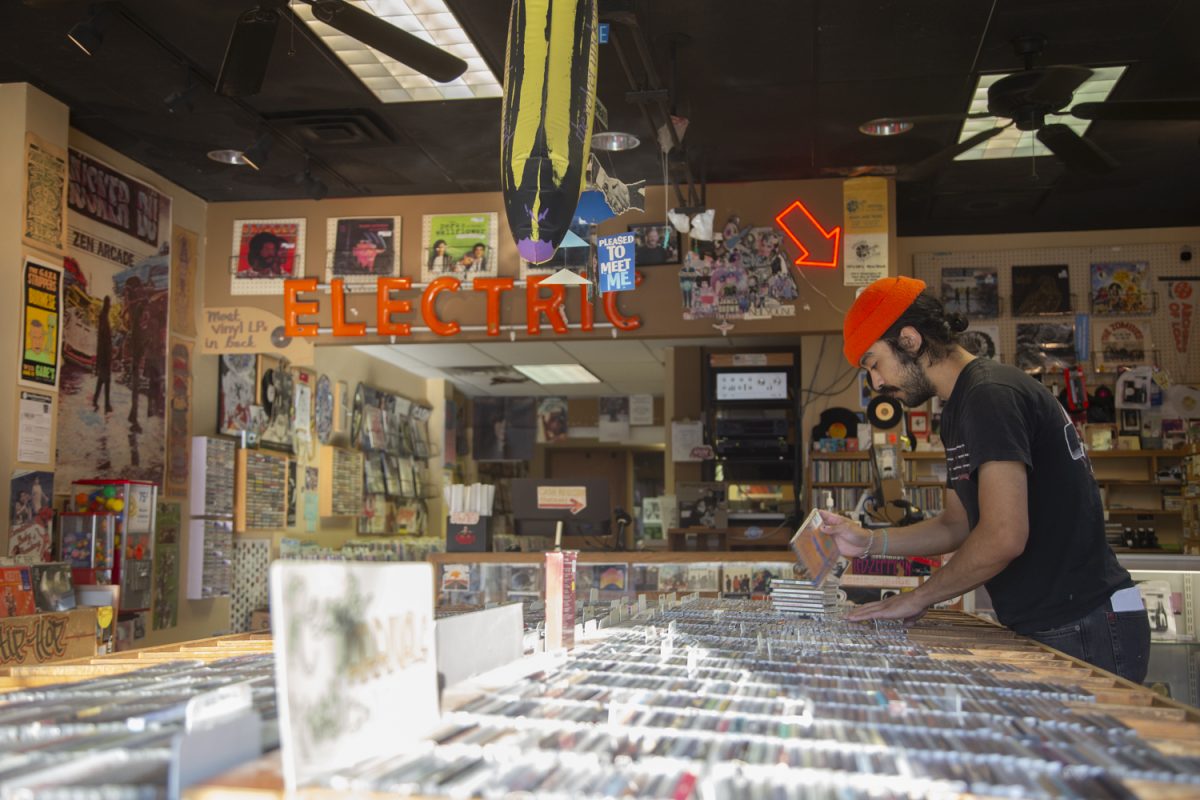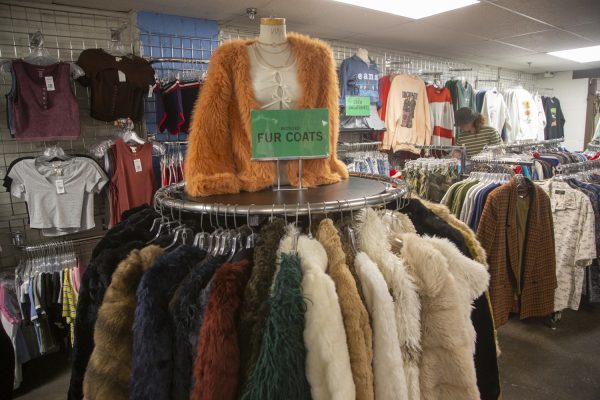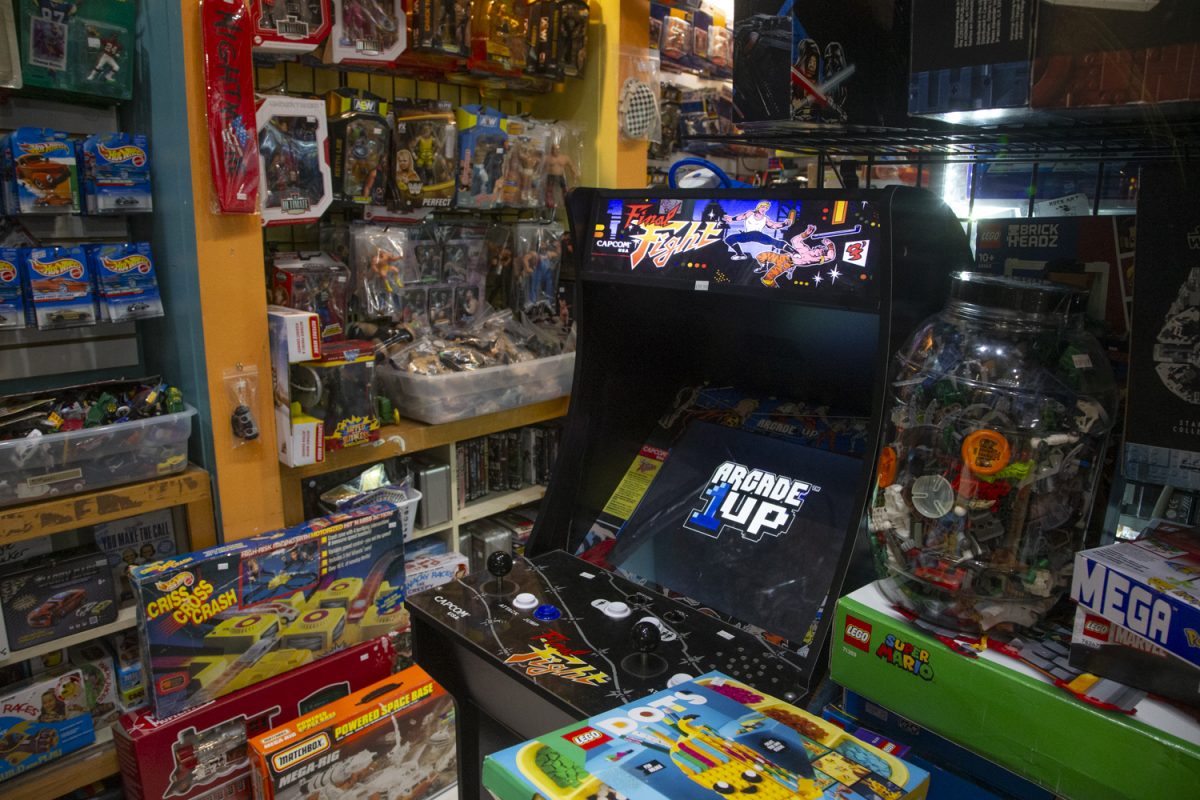With AI technology running rampant and people increasingly glued to their phones, Gen Z is becoming nostalgic for the past.
Polaroid cameras, vinyl records, and used clothing have been flying off the shelves. Despite this generation being the most tech-dependent alive, social influences have pushed young people to gravitate toward the old rather than the new.
Iowa City is a prominent college town, and investing in nostalgic memorabilia is a lucrative venture. Many businesses advertise to the college demographic, emphasizing vintage items including clothes and other collectibles.
One such business is Record Collector, a record shop in downtown Iowa City that carries both vintage and contemporary vinyls, CDs, and other forms of physical music media.
“More students are realizing that the same things that made vinyl cherished by our parents’ generation are the same things we crave,” Oscar Rodriguez, a University of Iowa graduate student working at Record Collector, said. “Having something physical that we associate good memories with is something that students are relating to right now.”
The tangible reminder of a good memory is more emotionally effective than pixels on a screen. Placing a record on the turntable, setting the needle down, and hearing the surface noise beneath the music creates a more immersive experience than clicking through Spotify.
“Chappell Roan’s record — we’ve been trying to keep it in stock for months and months, but every time we get it, we sell out of it. We just sold two copies today,” Rodriguez said. “On top of that, we sell a lot of ‘60s and ‘70s stuff students’ parents would listen to. The Talking Heads, Blondie, Bee Gees, you name it.”
A concept as ambiguous as nostalgia is hard to physically quantify and describe. Bartertown Toys and Collectibles at the Old Capitol Mall, however, does just that.
Jeremy Ziegenhorn opened the store three years ago and has always been interested in the world of memorabilia, trading items with his friends as a child.
“I had been doing conventions for many years before [opening the store], and then before that, I’d just been a huge collector since I was a little kid,” Ziegenhorn said.

Nostalgia has always been popular, but the idea has begun to increasingly surface as more people long for their favorite memories of the past. As the distance between the present and a fond memory increases, the desire to recapture that good feeling only grows stronger.
“Nostalgia has always been there. It’s a human condition. As we get older, we long for those days gone and a lot of these things just click that memory of way back when — the good times, and things like that,” Ziegenhorn said.
Bartertown is filled wall-to-wall with collectibles from all different decades and genres. Walking around the store is like touring multiple eras at once. From comic books and action figures to old electronics and movies, Ziegenhorn spends his days in what could be described as a nostalgia wonderland.
“For me, it’s the action figures from the ‘80s, which was the golden age of toys, so that’s my bread and butter because I was born in ‘81. I always tell people, ‘If I win the lottery, I’m building Castle GraySkull,’ Ziegenhorn said, referencing a fictional castle from the popular animation He-Man and the Masters of the Universe. “I will live in that sucker.”
The store has become a hotspot for collectors in Iowa City. It draws in not just university and high school students but people of all ages and hobbies. Ziegerhorn said he is eager to expand upon the success the store has already seen.
With a massive collection of items, it can be difficult for Ziegenhorn to choose what is displayed in his modestly sized store.
“There’s hot things like video games we’ll put out right away. I’ve bought massive collections of different things, especially these last three years, so then I don’t have room for it,” Ziegenhorn said.
Living and working in a college town, Ziegenhorn gets to meet and speak with people from around the world and many different generations. This is an opportunity he cherishes deeply.

“It’s crazy because the college kids come and they’re blown away by [the store] and their parents come with them and they’re blown away by it, so it transcends all age groups,” Ziegenhorn said.
Along with records and collectibles, thrifting has become a major trend among Gen Z. Ragstock, a leader in selling vintage clothing, can’t keep its recycled items in stock.
“Vintage is such a hodge-podge of random stuff. You’ll end up finding something so specific to you when you go vintage shopping, whereas if you’re shopping at a chain retail store, a lot of times it’s much harder to find unique pieces,” Tristan Farmer, a UI graduate and Ragstock employee, said.
In an age where a simple internet search leads to virtually any article of clothing, sifting through a pile of vintage clothes may seem like a lost cause. However, Farmer theorized students enjoy thrifting more than the easier internet route because of the gratification.
Spending time searching through hundreds of thrifted items gives way to a sensation of accomplishment when a good find is discovered. Information is constantly accessible thanks to the dawn of the internet but finding something special in a bin of old clothes takes a certain level of dedication. It’s not as simple and impersonal as typing a word into a search bar.
There are other reasons to shop secondhand. With prices rising everywhere, thrifting allows students to buy items without breaking the bank.
The moral and environmental aspects of thrifting also play into the popularity of nostalgia.
Shein, a popular fashion site, sells clothes for low prices, leading to overconsumption. Many of their low-quality products end up directly in landfills.
“You don’t want to buy from Shein, but Shein is the most affordable thing right now,” Farmer said. “Most college kids don’t have the money to pay for new stuff, so I can go thrifting and get it secondhand, and then I’m not supporting these awful businesses.”



